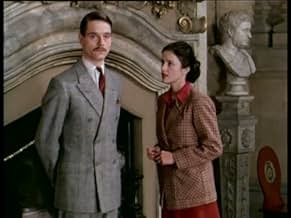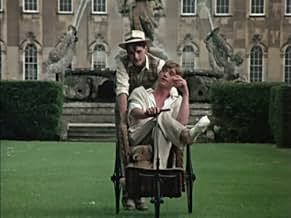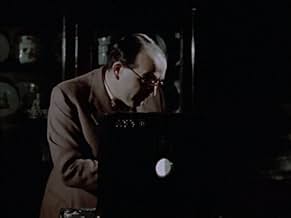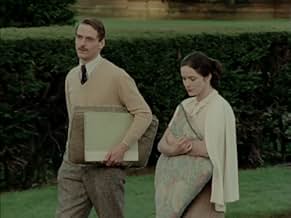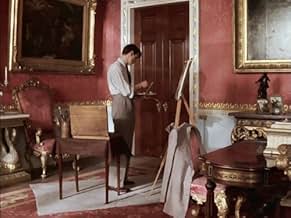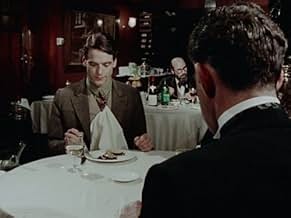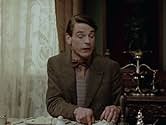La vida, amistades y romances del protagonista Charles Ryder, incluida su amistad con los Flyte, una familia de ricos católicos ingleses que viven en una mansión palaciega llamada Brideshead... Leer todoLa vida, amistades y romances del protagonista Charles Ryder, incluida su amistad con los Flyte, una familia de ricos católicos ingleses que viven en una mansión palaciega llamada Brideshead Castle.La vida, amistades y romances del protagonista Charles Ryder, incluida su amistad con los Flyte, una familia de ricos católicos ingleses que viven en una mansión palaciega llamada Brideshead Castle.
- Ganó 1 premio Primetime Emmy
- 13 premios ganados y 19 nominaciones en total
Explorar episodios
Opiniones destacadas
Everyone is of course entitled to an opinion about matters such as this, but how anyone can rate this series as anything less than a great milestone in television is, to my mind at least, quite difficult to understand.
I recently re-read Evelyn Waugh's wonderful novel and was, consequently, inspired to watch the series for the fourth time, on DVD on this occasion. It is disappointing that the DVD boxed set contains no additional features as one would expect from a series which is so highly regarded by so many people. At least, interviews with the stars and comments by the Director, Charles Sturridge, would have been welcome. In that respect, the DVD set can be seen to be somewhat lacking.
However, the acting, direction, costume design, sets and John Mortimer's brilliant adaptation of the novel for television make this one of the greatest achievements in television and a demonstration of what can be accomplished in that medium with a great deal of care for detail.
What I find particularly heart-rending is the transition from the light and airy early scenes to the darker ending of the series. I am really not sure whether this comment contravenes the "spoiler" guidelines but I suspect that I'm on reasonable safe ground in that regard.
I would go so far as to suggest that "Brideshead Revisited" lives up to the comments which were made about it at the time of its release in the early '80s that it is one of the greatest television series ever produced and it is hardly surprising to me at least that a series of such enduring quality emanated from the UK.
10 out of 10 from me. I am looking forward to reading the book and seeing the series again at some time in the not too distant future.
Please do yourselves a great favour and read the novel and then see the series. You will find, as I have done, that it is a true classic and a faithful adaptation from the novel to the small screen.
I recently re-read Evelyn Waugh's wonderful novel and was, consequently, inspired to watch the series for the fourth time, on DVD on this occasion. It is disappointing that the DVD boxed set contains no additional features as one would expect from a series which is so highly regarded by so many people. At least, interviews with the stars and comments by the Director, Charles Sturridge, would have been welcome. In that respect, the DVD set can be seen to be somewhat lacking.
However, the acting, direction, costume design, sets and John Mortimer's brilliant adaptation of the novel for television make this one of the greatest achievements in television and a demonstration of what can be accomplished in that medium with a great deal of care for detail.
What I find particularly heart-rending is the transition from the light and airy early scenes to the darker ending of the series. I am really not sure whether this comment contravenes the "spoiler" guidelines but I suspect that I'm on reasonable safe ground in that regard.
I would go so far as to suggest that "Brideshead Revisited" lives up to the comments which were made about it at the time of its release in the early '80s that it is one of the greatest television series ever produced and it is hardly surprising to me at least that a series of such enduring quality emanated from the UK.
10 out of 10 from me. I am looking forward to reading the book and seeing the series again at some time in the not too distant future.
Please do yourselves a great favour and read the novel and then see the series. You will find, as I have done, that it is a true classic and a faithful adaptation from the novel to the small screen.
A dream cast with a magnificent script (John Mortimer) brings to life Evelyn Waugh's elegiac upon the between-wars years. Golden years and golden people are lost, and the sense of loss is captured in the changes inflicted on the buildings, and in Geoffrey Burgon's heart-wrenching score. Brideshead captures the clash of humanistic values with those of old-time Catholicism, while tracing the decline of an aristocratic (somewhat precious) family, in a series that is part comedy, part romance, part tragedy. It is an enriching experience that no-one should miss.
Evelyn Waugh's 'Brideshead Revisited' is, I think, the quintessential and the finest novel of the twentieth century - English literature at its highest form. And this 1981 miniseries does the novel great justice: its episodes give us television's finest hours.
The splendid cast makes the most of the rich script, which is as faithful to a novel as a script can be. My favorite is Phoebe Nicholls as Lady Cordelia: her performance is disarming, utterly charming. And Nickolas Grace plays to the hilt the sybaritic, viper-tongued Anthony Blanche.
Jeremy Irons does sterling service as the narrator, Charles Ryder, who is, after all, Waugh's observant eye and eloquent tongue; Irons depicts poignantly Ryder's "conversion to the Baroque" crashing to bits against the cold gracelessness of "The Age of Hooper". As the rapidly dissolving Lord Sebastian Flyte Anthony Andrews is memorable - should Waugh's book ever again be adapted for the screen the lot of the actor cast as Sebastian will not be enviable.
Claire Bloom's Lady Marchmain is a study in quiet dignity upheld vainly in the face of the twentieth century's ravaging of her character's world and sensibilities. Sir Laurence Olivier's Lord Marchmain is letter-perfect; and in the deathbed sequences Olivier's performance is tenderly, expertly nuanced.
Diana Quick was a bit too old to play convincingly the debutante Lady Julia of the early episodes, but in the later ones Quick hits perfectly every disillusioned, jaded, repentant note. Charles Keating as Rex, who inhabits a "harsh acquisitive world", is an exemplar of shallowness, of the venality Waugh detested - and satirized so hilariously in his earlier novels: he's nothing more than a Hooper with money and ambition.
Simon Jones gives us Bridey's stodginess and bewliderment with marvelous understatement. John Gielgud steals every scene as Charles's father Edward, brilliantly interpreting of one of Waugh's most delicious, yet indigestible characters.
There are rich offerings, too, from character actors: Stephane Audran glows warmly as Clara, Lord Marchmain's insightful, intuitive, down-to-earth mistress; John LeMesurier leaves us suitably agape as the Jesuit Father Mowbray baffled and dismayed by Rex's utilitarian approach to his conversion to Catholicism; Jeremy Sinden sails naively along as the indefatigable yet ever-dimwitted and clueless Boy Mulcaster; Ronald Fraser stirs just the right sloshing of queasiness as the peculiar, opportunistic shipboard cocktail party guest; Jonathan Coy, as the parlous, seedy Kurt, is perfectly repellent; Jane Asher tiptoes delicately through Celia Ryder's conventional, porcelain sensibilities; and Mona Washbourne knits a thoughtful, lovely portrait of Nanny Hawkins.
Throughout 'Brideshead Revisited' the photography is lush, meticulous, yet tasteful. The score is understated, never intrusive, always complementary. Costuming, set design and, above all, location, are unrivalled. Charles Sturridge's direction is evenhanded, assured - and his pacing of the narrative treads adroitly every beautifully-modulated beat.
I bought the DVD version of this series and, though occasional bits of the image transfer are a trifle fuzzy and the sound re-recording is sometimes uneven, the nicely boxed set of discs pleased - and goes on pleasing - me greatly.
In the early third millennium, a time of evermore immature programming and production executives - a dismal age of TV's Hoopers, I have to suspect sadly that television will never again attain the heights to which 'Brideshead Revisited' vaulted. But I shall remain ever grateful for this magnificent series.
The splendid cast makes the most of the rich script, which is as faithful to a novel as a script can be. My favorite is Phoebe Nicholls as Lady Cordelia: her performance is disarming, utterly charming. And Nickolas Grace plays to the hilt the sybaritic, viper-tongued Anthony Blanche.
Jeremy Irons does sterling service as the narrator, Charles Ryder, who is, after all, Waugh's observant eye and eloquent tongue; Irons depicts poignantly Ryder's "conversion to the Baroque" crashing to bits against the cold gracelessness of "The Age of Hooper". As the rapidly dissolving Lord Sebastian Flyte Anthony Andrews is memorable - should Waugh's book ever again be adapted for the screen the lot of the actor cast as Sebastian will not be enviable.
Claire Bloom's Lady Marchmain is a study in quiet dignity upheld vainly in the face of the twentieth century's ravaging of her character's world and sensibilities. Sir Laurence Olivier's Lord Marchmain is letter-perfect; and in the deathbed sequences Olivier's performance is tenderly, expertly nuanced.
Diana Quick was a bit too old to play convincingly the debutante Lady Julia of the early episodes, but in the later ones Quick hits perfectly every disillusioned, jaded, repentant note. Charles Keating as Rex, who inhabits a "harsh acquisitive world", is an exemplar of shallowness, of the venality Waugh detested - and satirized so hilariously in his earlier novels: he's nothing more than a Hooper with money and ambition.
Simon Jones gives us Bridey's stodginess and bewliderment with marvelous understatement. John Gielgud steals every scene as Charles's father Edward, brilliantly interpreting of one of Waugh's most delicious, yet indigestible characters.
There are rich offerings, too, from character actors: Stephane Audran glows warmly as Clara, Lord Marchmain's insightful, intuitive, down-to-earth mistress; John LeMesurier leaves us suitably agape as the Jesuit Father Mowbray baffled and dismayed by Rex's utilitarian approach to his conversion to Catholicism; Jeremy Sinden sails naively along as the indefatigable yet ever-dimwitted and clueless Boy Mulcaster; Ronald Fraser stirs just the right sloshing of queasiness as the peculiar, opportunistic shipboard cocktail party guest; Jonathan Coy, as the parlous, seedy Kurt, is perfectly repellent; Jane Asher tiptoes delicately through Celia Ryder's conventional, porcelain sensibilities; and Mona Washbourne knits a thoughtful, lovely portrait of Nanny Hawkins.
Throughout 'Brideshead Revisited' the photography is lush, meticulous, yet tasteful. The score is understated, never intrusive, always complementary. Costuming, set design and, above all, location, are unrivalled. Charles Sturridge's direction is evenhanded, assured - and his pacing of the narrative treads adroitly every beautifully-modulated beat.
I bought the DVD version of this series and, though occasional bits of the image transfer are a trifle fuzzy and the sound re-recording is sometimes uneven, the nicely boxed set of discs pleased - and goes on pleasing - me greatly.
In the early third millennium, a time of evermore immature programming and production executives - a dismal age of TV's Hoopers, I have to suspect sadly that television will never again attain the heights to which 'Brideshead Revisited' vaulted. But I shall remain ever grateful for this magnificent series.
10curt-28
It is exceptional to find something in life that improves with age. Brideshead Revisited is one of those exalted things. Having just completed watching the entire series I can say that it is actually better than I remembered when I first saw it over 15 years ago. Seldom do so many things (cast, writing, locations, costumes) come together and form a harmonious whole. Brideshead is a tour-de-force of the film maker's art that glows with a magical intensity all its own.
Brilliantly adapted by John Mortimer from Evelyn Waugh's celebrated novel of England between the first and second World Wars, BRIDESHEAD REVISITED may be the best miniseries ever made. Smoothly and subtly directed by Charles Sturridge and Michael Lindsay-Hogg, the twelve hour program is beautiful to look at, the cast is remarkable, and the story has amazing impact.
The miniseries follows the novel closely, beginning near the end of World War II as Charles Ryder (Jeremy Irons) grows disdainful of military life, which he finds a study in futility--and then flashes back twenty years as Ryder recalls his relationship with the aristocratic Marchmain family, a relationship that begins when he becomes friendly with Marchmain son Sebastian Flyte (Anthony Andrews) while the two are students at Oxford.
The miniseries captures perfectly a golden moment of youth--and then the gradual disillusionment brought by the passage of time. Like all great works, BRIDESHEAD REVISITED--both book and film--touches on a great many themes, most specifically an innocent type of homoeroticism, loss of innocence, alcoholism, adultery, and changing society; ultimately, however, the story is about spiritual values and how they survive in even the most unlikely of circumstances--and how God works through individuals in the most unexpected ways.
The performances here are truly fine beyond description. Jeremy Irons has seldom surpassed his work here, and neither Anthony Andrews nor Dianna Quick (as Julia, Sebastian's sister) have ever bested their performances in this film. In addition to the three leads, the miniseries offers an incredible array of superior performances by John Gielgud, Claire Bloom, and Laurence Olivier; the cinematography and art design is flawless; and the score by Geoffrey Burgon is exquisite. Mortimer's script is remarkable in that it not only manages to recreate the novel, it also manages to capture the intangible, spiritual elements upon which the book plays but seldom directly references. A must-own work for any one who appreciates the best of the best; strongly, strongly recommended.
Gary F. Taylor, aka GFT, Amazon Reviewer
The miniseries follows the novel closely, beginning near the end of World War II as Charles Ryder (Jeremy Irons) grows disdainful of military life, which he finds a study in futility--and then flashes back twenty years as Ryder recalls his relationship with the aristocratic Marchmain family, a relationship that begins when he becomes friendly with Marchmain son Sebastian Flyte (Anthony Andrews) while the two are students at Oxford.
The miniseries captures perfectly a golden moment of youth--and then the gradual disillusionment brought by the passage of time. Like all great works, BRIDESHEAD REVISITED--both book and film--touches on a great many themes, most specifically an innocent type of homoeroticism, loss of innocence, alcoholism, adultery, and changing society; ultimately, however, the story is about spiritual values and how they survive in even the most unlikely of circumstances--and how God works through individuals in the most unexpected ways.
The performances here are truly fine beyond description. Jeremy Irons has seldom surpassed his work here, and neither Anthony Andrews nor Dianna Quick (as Julia, Sebastian's sister) have ever bested their performances in this film. In addition to the three leads, the miniseries offers an incredible array of superior performances by John Gielgud, Claire Bloom, and Laurence Olivier; the cinematography and art design is flawless; and the score by Geoffrey Burgon is exquisite. Mortimer's script is remarkable in that it not only manages to recreate the novel, it also manages to capture the intangible, spiritual elements upon which the book plays but seldom directly references. A must-own work for any one who appreciates the best of the best; strongly, strongly recommended.
Gary F. Taylor, aka GFT, Amazon Reviewer
¿Sabías que…?
- TriviaOriginally, producer Derek Granger asked Anthony Andrews to play the role of Charles Ryder. Andrews, however, felt he was better suited for the part of Sebastian Flyte. Jeremy Irons, Granger's first choice for Sebastian, preferred to play Ryder, so the two actors swapped roles.
- Versiones alternativasThe voiceover in the early Venice sequences was added for the American version after producer Derek Granger saw the initial British broadcast and felt there was not a strong enough sense of the religious feelings evoked while viewing the paintings.
- ConexionesFeatured in The 34th Annual Primetime Emmy Awards (1982)
Selecciones populares
Inicia sesión para calificar y agrega a la lista de videos para obtener recomendaciones personalizadas
- How many seasons does Brideshead Revisited have?Con tecnología de Alexa
Detalles
- Fecha de lanzamiento
- País de origen
- Idioma
- También se conoce como
- Wiedersehen mit Brideshead
- Locaciones de filmación
- Castle Howard, Henderskelfe, York, North Yorkshire, Inglaterra, Reino Unido(Brideshead Castle: exterior and some interiors)
- Productora
- Ver más créditos de la compañía en IMDbPro
Contribuir a esta página
Sugiere una edición o agrega el contenido que falta

Principales brechas de datos
What is the Brazilian Portuguese language plot outline for Brideshead Revisited (1981)?
Responda



